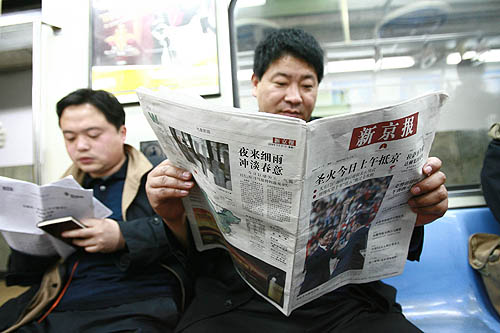|
 |
|
TARGET OF BAN: A Beijing subway rider reads a newspaper on March 31, 2008 (YIN DONGXUN) |
Avoiding Waste
A newly built primary school in Fuzhou, capital of southeast China's Fujian Province, which cost 15 million yuan ($2.3 million), is to be demolished because the city government decided to build a central business district on its site.
This short-lived school represents a huge waste of taxpayers' money and construction materials. If the money had been spent on the building of rural primary schools, several dozens of schools would have risen up in remote mountainous regions.
Moreover, according to the 2-year-old City Planning Law of China, a city's overall construction planning should survive no less than 20 years and basic infrastructure and public service facilities should be given priority.
The so-called "central business district" is nothing but a project for the local government to show off, while the primary school is certainly more significant to local children's growth.
There are too many examples of failed urban construction projects. Basically, this school has been short-lived because of the lack of a strong legal and democratic mechanism to oversee the government's behavior.
To avoid the repetition of such a huge waste of money and energy, it's important to restrain administrative power and respect the lifespan of construction projects.
Beijing Times
Positive Reform
From 2010, some 80 percent of the civil service vacancies in Beijing are only open to people with at least two years' work experience. Also, beginning 2011, except for some designated posts, the municipal government, as well as district and county governments under its jurisdiction, will no longer recruit new college graduates as civil servants.
Rather than discriminating against them, disqualifying new college graduates in the civil service exam will instead help the heavily oversubscribed admission examination. Take the 2010 exam for example. Some 1.46 million people competed for 15,000 job vacancies at Central Government agencies, with most of the examinees being college graduates in 2010.
The exclusion to be effective in Beijing will prevent new graduates from rushing to sit the exam even if they have not prepared for it at all. It will also encourage new college graduates to explore more extensive employment opportunities. With civil service vacancies no longer available, new graduates have to try for grassroots jobs. Within two years, they will accumulate a great deal of work experience and eventually find a job that suits their capabilities and cater to the country's needs.
Work-experienced candidates will help raise the overall quality of the civil service team, too. Civil servants are supposed to be good at analyzing and solving problems. Most new graduates, however, only have book learning. Although they may score high marks in the admission exam, they are always helpless in face of real problems.
In general, this reform will make the civil service team more effective.
Guangzhou Daily
Newspaper Ban
The Beijing subway has long been praised for its multiple routes, accurate schedules and reasonable fares. Yet lately the Beijing subway has been dragged into dispute because of a ban on newspaper distribution.
The management of Beijing's subway network has banned all newspapers from being sold in local subway stations from last month. But the claimed safety concerns are totally unconvincing.
For the newspaper industry, subway stations are a big market. In major cities in China, many newspapers fight intensely for a share of this market. If newspaper distributors promise not to disturb public order, shouldn't they be allowed distribution in subway stations?
A successful public policy needs to take citizens' convenience into consideration.
Buying and reading newspapers while riding subway trains are not only helpful to kill time, but also part of the cultural landscape of a city. It shouldn't be banned but be nurtured and cultivated.
If the government really has the public interest in mind, it should listen to advice and opinions, especially passengers' views, before making decisions.
The Beijing News
Our Beautiful Language
Ji Xianlin (1911-2009), a great Chinese linguist and historian, once expressed worry that many of his countrymen were sorry they had Chinese as their mother tongue. This trend seems to be growing, as six universities in Shanghai have recently made English compulsory for their joint admission exams and left Chinese out.
There is no doubt that the English language is a very important medium of education. But it is not the reason why we should forget the importance of our mother tongue and the traditions and culture of which it is an integral and important part.
The Chinese language is what makes China a nation. It allows Chinese people around the world to communicate smoothly with each other.
Once we stop according due respect to our mother tongue, our history, culture and traditions could also become a matter of shame for us. And the result of such a situation can only be bitter and painful.
Therefore we should not view our mother tongue as a burden. Only through our own language can our culture find the glory it truly deserves.
Chinese Business View | 